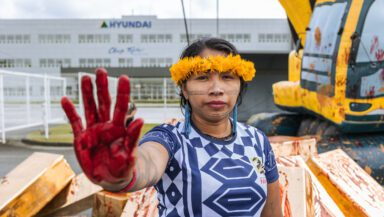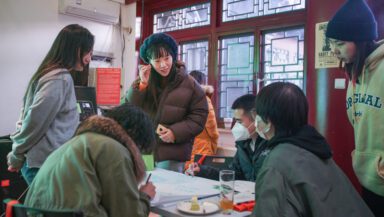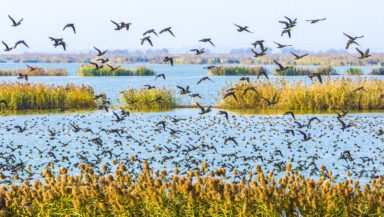Indigenous Peoples make up less than 5% of the world’s population, but safeguard 80% of the world’s remaining biodiversity. Their close and often spiritual connection to their land long predates colonial invasion and settlement.
Indigenous-occupied land is better preserved than even government-protected areas like parks and wildlife reserves in Canada, Australia and Brazil.
One study reveals that Indigenous lands in Brazil have the potential to prevent the emission of 31.8 million tonnes of CO2 per year, equivalent to taking about 6.7 million cars off the roads for a year.
In 2018, the Intergovernmental Panel on Climate Change verified that protecting Indigenous lands is one of the simplest and most effective ways to stop the global climate emergency in its tracks.
Indigenous Peoples take the preservation of their land extremely seriously – and in an age of environmental crisis, we should all be taking notes.
A matter of life and death – and the survival of their people
The genocide of Indigenous Peoples is a real and growing fear in Brazil. In the Brazilian Amazon and other biodiverse areas such as the Cerrado, nearly a million people from 305 ethnic groups have fought continually against attacks on their lands and cultures for hundreds of years.
Today, in the Cerrado they fight the industrialised animal feed industry which grows soya to feed chicken and meat all over the world.
In the Amazon, Brazil’s Guajajara Guardians patrol their ancestral land, the Araribióa, protecting the forest and their “uncontacted” relatives, the Awá people, from loggers.
They can – and do – pay with their lives.
Paulo Paulino Guajajara, an Amazon Guardian, was shot and killed while out hunting by loggers. His companion Tainaky, who was also shot but survived, is featured in the video below.
Did you know 80% of the biodiversity in the world is to be found on Indigenous lands?
Find out how the Indigenous Peoples of the Amazon are protecting the world's largest rainforest, and how they are putting their lives on the line to do so. pic.twitter.com/TOG9xlYfz2
— Greenpeace UK (@GreenpeaceUK) November 11, 2019
A toxic combination of racism and land-grabbing industry
Brazil has always been near the very top of the table when it comes to murders of environmentalists. Unsurprisingly, Indigenous Peoples often make up the bulk of those assassinated.
President Jair Bolsonaro is making an already fractious situation for Indigenous Peoples much, much worse. Bolsonaro and his cronies have encouraged invasions by farmers, loggers and miners, and continue to incite violence against Brazil’s Indigenous Peoples.
Bolsonaro’s response to international criticism over the Amazon fires clearly showed his disregard Indigenous rights, who he sees as part of a “conspiracy” to hinder Brazilian economic growth.
Warnings from the Amazon are growing louder
Indigenous leaders have been issuing stark warnings like this one that a free-market, globalised economy obsessed with profit at all costs is destroying our planet.
Their warnings have grown louder since the Amazon fires crisis made global news in 2019. The devastation of the fires has highlighted just how much Indigenous Peoples are on the frontlines of the climate and nature emergencies.
Much less publicised than the smouldering rainforest, however, are the moving stories of forest defenders, particularly those killed while protecting their homes. To add another layer of injustice, there are often few consequences for those who commit violence against them.
However, according to the Brazilian justice minister Sérgio Moro, the murder of Paulo Paulino will be thoroughly investigated. If true, this might mark some small progress in justice for the defenders of the Amazon. It also suggests that public pressure works.
Indigenous Peoples’ knowledge can help in the fight against climate change
Indigenous communities describe having a special connection with the land they live on. Because of this, they know the intricacies of the natural world on their ancestral lands better than anyone else.
Indigenous Peoples also have an acute sense of intergenerational justice. They work hard to ensure the next generation has access to the same quality of environment and natural resources as they’ve had. They do this work even in these dangerous circumstances, and even as their environments degrade or are destroyed around them.
This has meant that Indigenous Peoples around the world have been able to measure and adapt to the impacts of climate change in their local areas – sometimes even more effectively than scientists and government officials.
But this important work cannot be done under continual threats of invasion by farmers, miners and loggers. It cannot be done while bureaucrats delay the demarcation of their lands, or in the ashes of their settlements.
Governments around the world that trade with Brazil must show their support for Indigenous land defenders, and condemn violence against them. This is not just because it is the right thing to do – taking a strong stand against racism, violence and land invasions by industry will ultimately help sustain life on our planet.
Consumers all over the world can help with the Indigenous fight in Brazil too. They can tell big brands to use less chicken and meat in their products and make sure supply chains do not contribute to violations of Indigenous rights and the destruction of their land.



